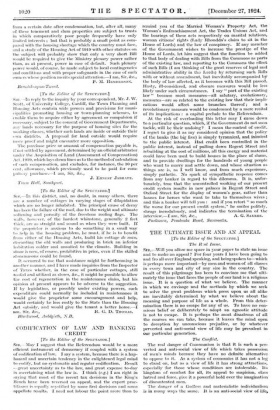CODIFICATION OF LAW AND BANKING CREDIT
[To the Editor of the SPECTATOR.] Sri,—May I suggest that the Referendum would be a more efficient instrument of democracy if coupled with a system of codification of law. I say a system, because there is a hap- hazard and uncertain tendency in the enlightened legal mind to codify, but no systematic and regular codification. Result —great uncertainty as to the law, and great expense to-day in ascertaining what the law is. I think (e.g.) I am right in saying that most of the recent tax decisions in the King's Bench have been reversed on appeal, and the expert prac- titioner is equally mystified by some first decisions and some appellate results. I need not labour the point more than to remind you of the - Married Woman's Property Act, the Woman's Enfranchisement Act, the Trades Unions Act, and the bearings of these acts respectively on marital relations, woman citizens' rights (Lady Rhondda's claim to sit in the House of Lords) and the law of conspiracy. If any member of the Government wishes to increase the prestige of the. House of Lords, let him suggest that the function be added to that body of dealing with Bills from the Commons as parts of the existing law, and reporting to the Commons the effect of such Bills (I am thinking of the great reserves of legal and administrative ability in the Lords) by returning such Bills with or without amendment, but inevitably accompanied by the body of law affected, as it becomes with this Bill passed. Hasty, ill-considered, and obscure measures would be less likely under such circumstances. I say " part of the existing law " because most measures—all salutary, evolutionary, measures—are so related to the existing law that their impli- cations would affect some branches thereof ; and a revolutionary measure would be condemned by a mere recital of its implications : a capital prelude to the Referendum.
At the risk of overloading this letter may I come down to a particular question, which, if the Government do not soon tackle, will be their undoing ? I mean the control of credit. I regret to give it as my considered opinion that the policy of the banks (the big five) is simply tyrannical, and inimical to the public interest. Had credit been controlled in the public interest, instead of pulling down Regent Street and rebuilding at the cost of millions, all this energy and material, could have been used to build houses in the place of slums, and to provide dwellings for the hundreds of young people who want to marry and settle down, and whose situation as things are is, as I well know, and from much experience, simply pathetic. No spark of sympathetic response comes from any banker in regard to this dilemma. It is, unfor- tunately, true that the uncontrolled working of our present credit system results in new palaces in Regent Street and Oxford Street for the display of women's gear, rather than houses for heroes who want to take to themselves wives ; and this a banker will tell you : and if you retort " so much the worse for our present credit system," he smiles politely, shrugs incredulously, and indicates the termination of the


























 Previous page
Previous page